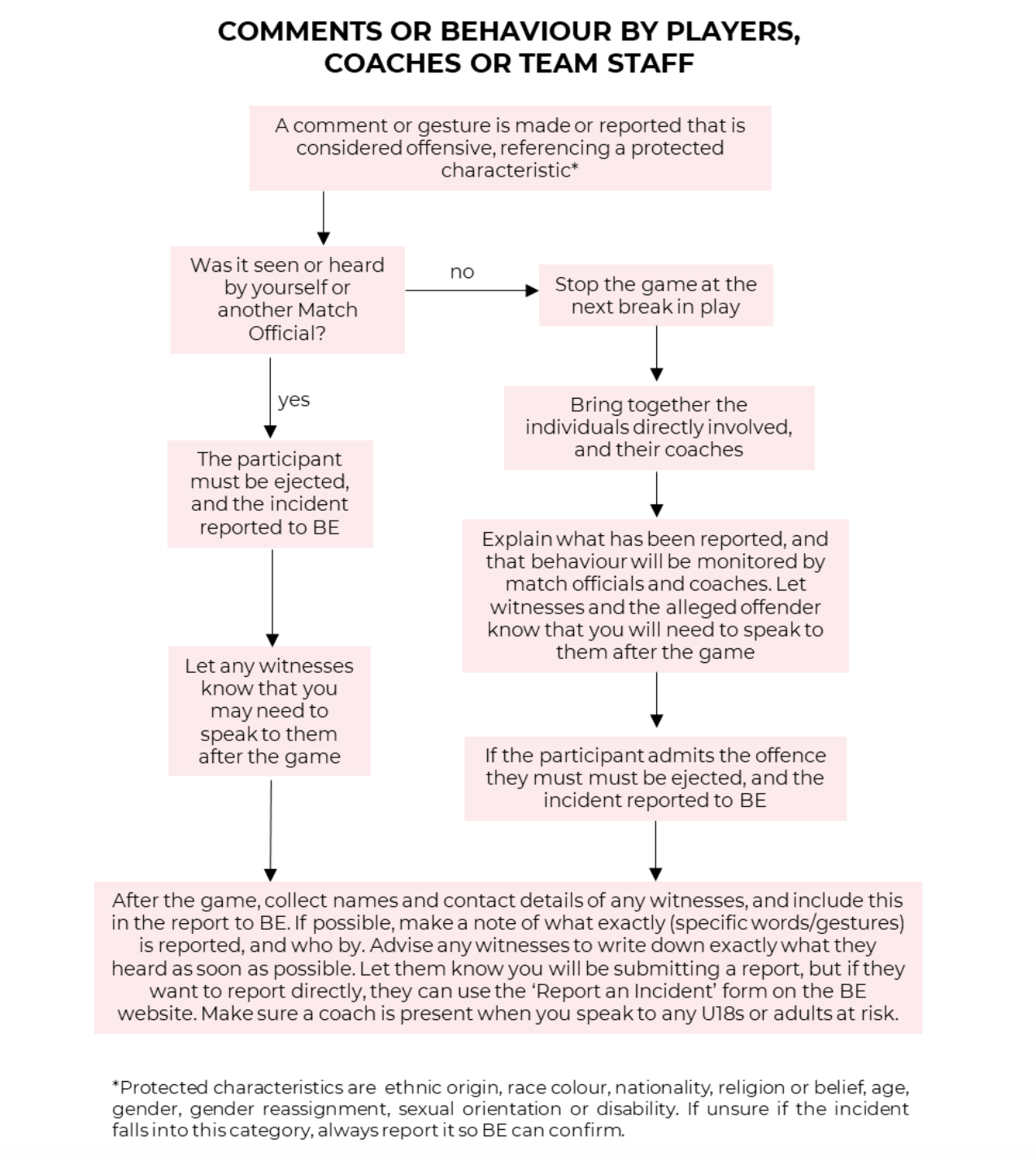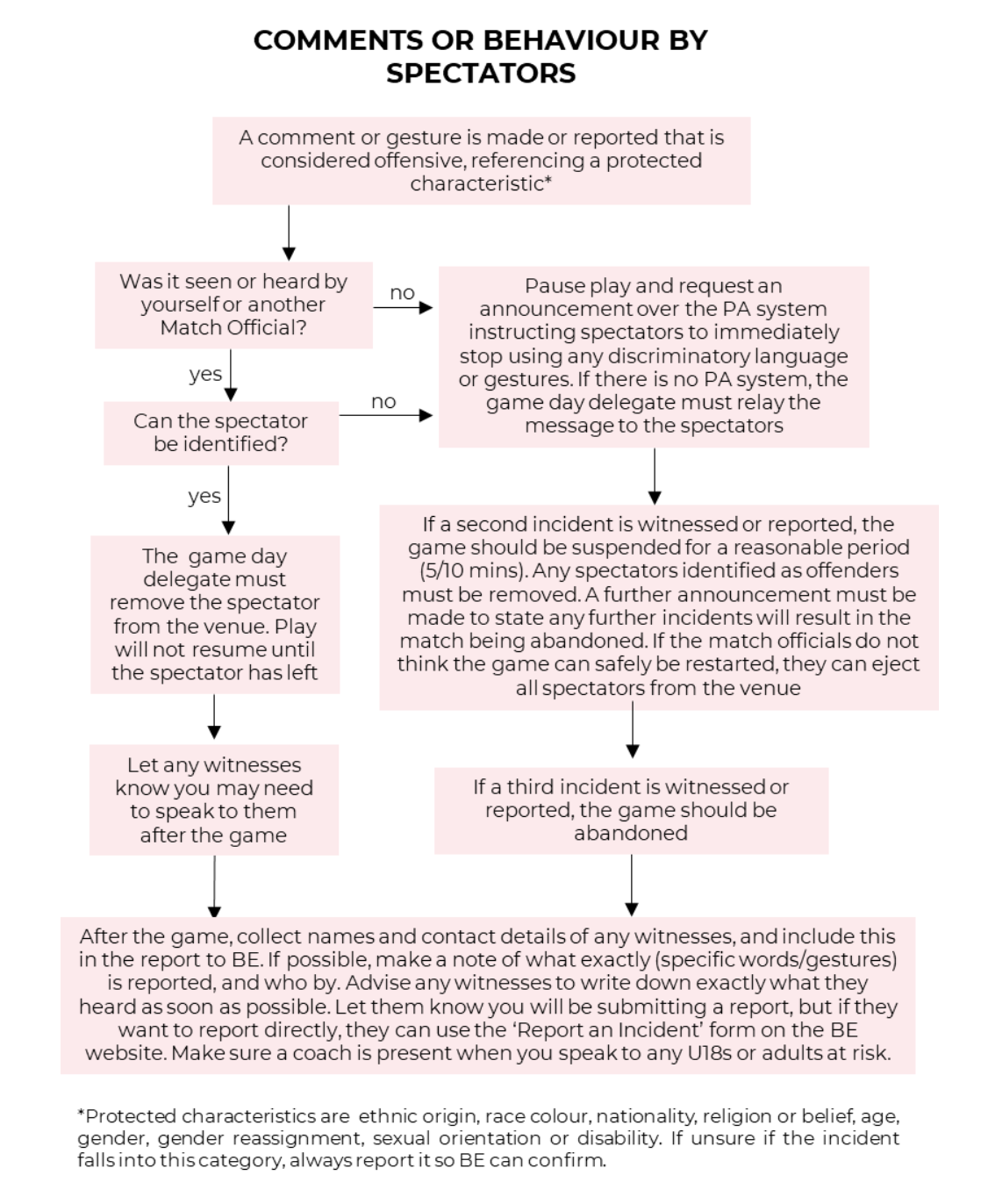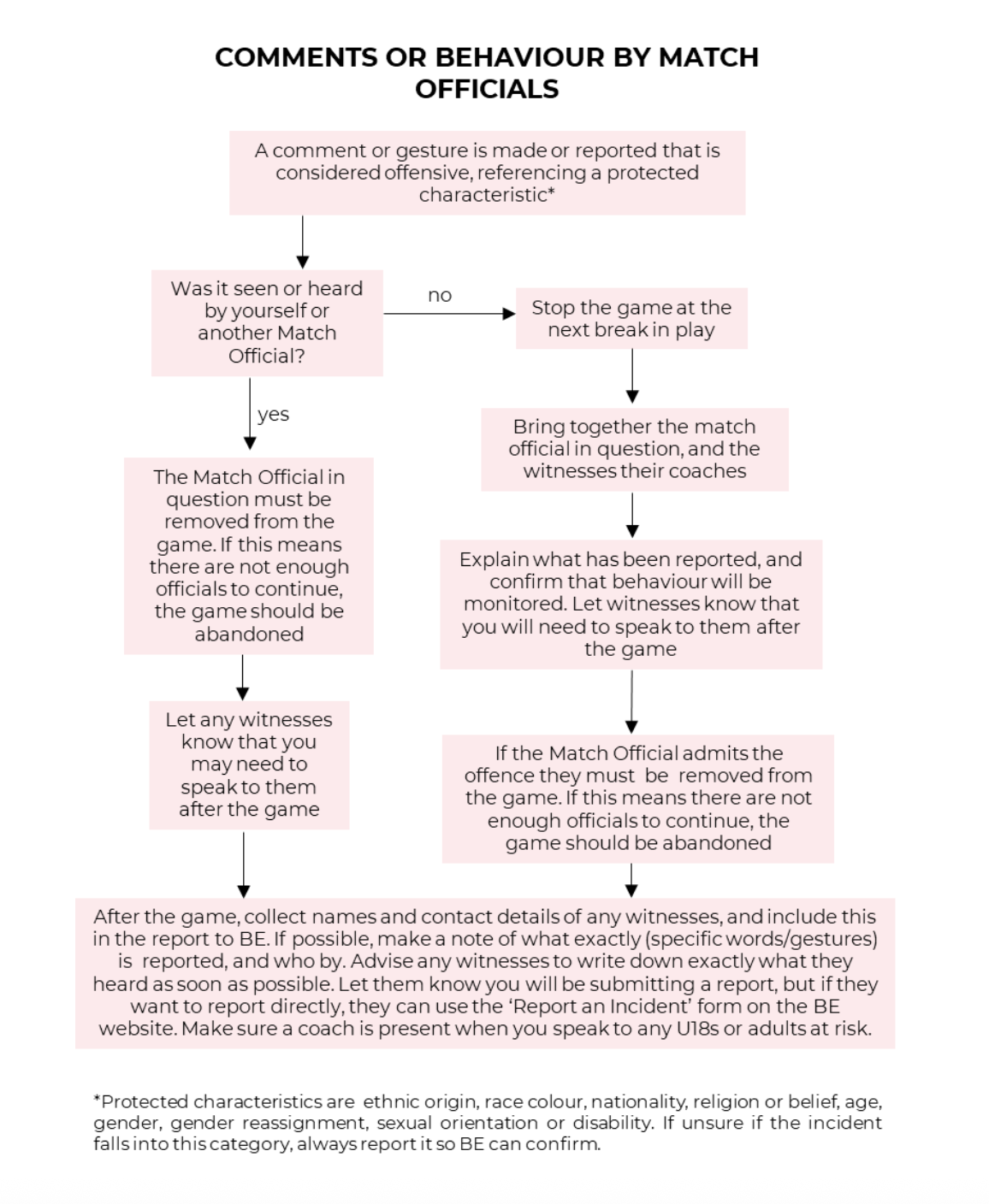Basketball England Disciplinary Code – Guidance for Match Officials
Guidance for match officials on applying the Basketball England Disciplinary Code.
Updated: July 2025
Definitions of terms used in this document can be found HERE
The Disciplinary Code aims to improve standards of behaviour by providing a clear, consistent and transparent process for handling discipline matters, to ensure everyone involved in basketball has a positive experience.
It sets out certain behaviours that will be treated as Serious Cases and details the procedures that must be followed. It is intended to build confidence in reporting and ensure any complaints or concerns are handled appropriately and fairly.
Match Officials will be instrumental in making sure the Disciplinary Code and the framework it provides are successfully followed and embedded throughout the game.
This guide will cover the following:
- Serious case overview
- Identifying Discrimination and Aggravated Breaches
- The role of Match Officials • The impact on Match Officials
- Dealing with Serious Cases - flowcharts
Serious case overview
- Serious cases include, but are not limited to, the following:
- Abusive or offensive language or behaviour that makes reference to a protected characteristic, whether in person, in writing, or on social media. These are referred to as ‘Aggravated Breaches’.
- Any act of victimisation or discrimination, in line with the Equality Act 2010.
- Violent or threatening language and/or behaviour towards a Match Official.
- Any other matter deemed appropriate by The Association at their sole discretion.
Other cases, for example, could include inappropriate language or behaviour, or bringing the game into disrepute, by a person in a role with notable authority or prominence.
Identifying discrimination and aggravated breaches
When defining discrimination, Basketball England follows the Equality Act 2010. Discrimination can be any of the following:
- Direct discrimination – treating someone with a protected characteristic less favourably than others.
- Indirect Discrimination – provisions or practices with the effect of putting someone with a protected characteristic at a disadvantage.
- Harassment – behaviour linked to a protected characteristic that violates dignity or creates an offensive environment.
- Victimisation – unfair treatment of any individual because they have raised or reported an act of discrimination.
Protected characteristics are listed in the Equality Act 2010 as: Age, Disability, Gender Reassignment, Marriage or Civil Partnership, Pregnancy or Maternity, Race, Religion or Belief, Sex, Sexual Orientation.
The Disciplinary Code in Basketball describes as Aggravated the use of language of behaviour that makes reference, whether explicitly or implied, to another person’s ethnic origin, colour, race, age, nationality, religion or belief, gender, gender reassignment, sexual orientation, or disability.
In most instances, Aggravated Breaches could also be considered as Harassment under the Equality Act. They are comments or behaviour making reference to a protected characteristic that cause offence.
When officiating it is more likely that offences witnessed or reported will be Aggravated Breaches, rather than Discrimination. It is important to look out for and be aware of offensive language or behaviour making reference to any of the listed characteristics.
Remember that the perception of the word is key, if it is usually or reasonably taken as a reference to a protected characteristic then it should be treated as such. The intent or meaning of the person making the comment isn’t relevant.
The role of match officials
Match Officials are often the first point of contact when there is an allegation at a game, either witnessing an incident or having it reported to them. Knowing what to do, both at the time and afterwards, is vital. The flowcharts further on should help outline the steps to take, making the process clear and structured.
There is an expectation from participants in the game that Match Officials will act with integrity and will be knowledgeable about the correct processes and procedures. It’s important to be familiar with the actions that should be taken, but also be honest and seek further advice when unsure about meanings of words or what action to take. It is far better to report something that didn’t need reporting, than not report something that should have been reported.
It should be emphasised that Match Officials have a responsibility to report any serious incidents directly to Basketball England, and failure to do so may result in action against the Match Official. This enables match officials to rebut any pressure not to report matters. The role of the Match Official is simply to report details of incidents or allegations; not to decide whether or not an allegation occurred, or whether suitable action has been taken, or what a suitable sanction should be.
The impact on match officials
There is a clear impact on Match Officials in relation to identifying and reporting Discrimination and Aggravated Breaches, as outlined above. There are also further impacts regarding behaviour both towards and by Match Officials.
The Disciplinary Code includes any violent conduct or threatening language/behaviour toward a Match Official as a Serious Case. This is to offer protection to Match Officials, and sanctioning guidelines are being introduced that support this position with lengthy suspensions included for any individual found Proven of such conduct.
The additional protection comes in recognition of the important role Match Officials have, and the expectation that Match Officials should be treated respectfully at all times. However, this comes alongside an expectation that Match Officials’ conduct will be exemplary and set the standard expected throughout Basketball, and any misconduct by Match Officials will also be treated seriously and will result in significant sanctions.
Flowcharts
The following flowcharts outline the steps that should be taken by Match Officials when there are offences, or allegations of offences. They are split into offences by players, coaches or team staff, offences by spectators, and offences by Match Officials.
In all cases, the Match Officials must each submit reports to Basketball England, and the Crew Chief must also include details of any witnesses and of anyone who has recorded the game. The reports must be submitted within 48 hours of the game, or by 12 noon on Tuesday for any Sunday fixture.
Match Officials should remind victims that any discriminatory behaviour can be reported to the police.



